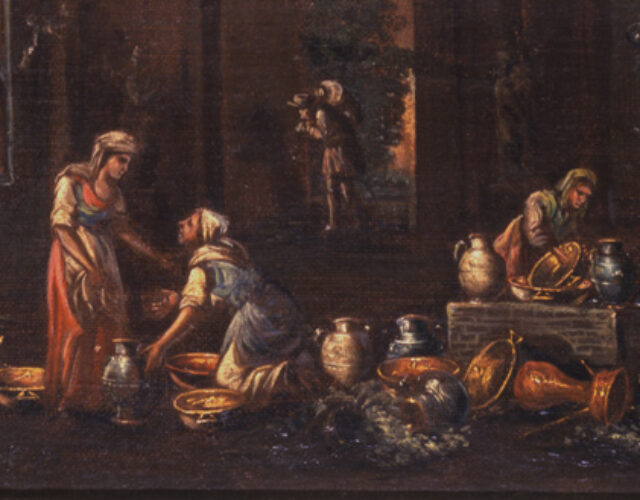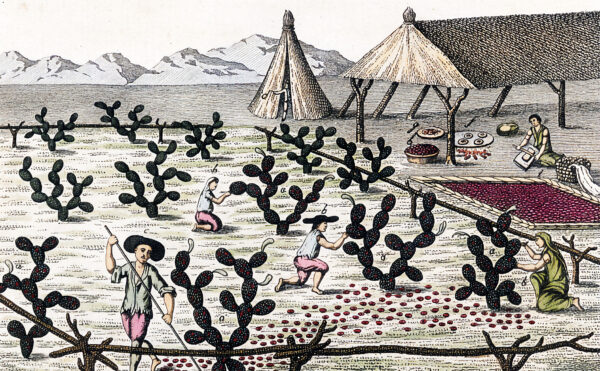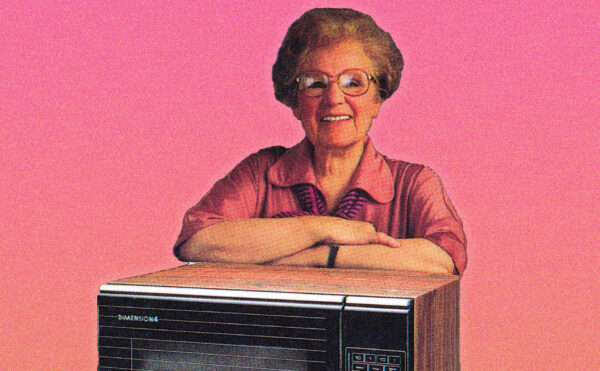While researching court documents related to 17th-century apothecaries, Judith S. Woolf found evidence of an unexpected subset of early pharmacists—women. Widows of apothecaries were given an opportunity to enter the pharmacy world by taking over their husbands’ businesses. These endeavors were not without their challenges, as evidenced in the histories Woolf found of three such publicly acknowledged female apothecaries: the Widow Wyncke, Susan Lyon, and Anne Crosse.
In early modern England women were expected to learn the basic techniques needed to make home remedies. They followed old traditions of making medicines to treat their extended families, and poor women often sold herbs and medicines to support their families. Some women kept kitchen gardens that included medicinal plants for their own use, while rich housewives provided medical assistance to people on their estates. Wealthy households even had separate stillrooms in which women prepared distillates. Apothecaries, in turn, provided advice and more complex remedies to patients.
King James I gave the apothecaries—originally members of the Guild of Grocers—their own guild in 1618, called the Company of Apothecaries. According to their charter, men from the apothecaries’ guild had the right to “go and enter into any Shop . . . House or . . . Cellar . . . of any Persons whatsoever, using or exercising the Art or Mystery of Apothecaries, or any part thereof, within the city of London . . . or within Seven Miles of the same city” to decide if the medicines made were acceptable.
In the 17th century wives could not own property, but qualified widows were allowed to run family businesses.
Apothecaries were much more than drug retailers in early modern England—they prepared medicines from materials like herbs and minerals. Candied rose petals, Oyl of Sulphur, cherry syrup, alum, almond oil, Aurum Potabile (made with gold), peppermint schnapps, and dried earthworms all found their way into prescriptions of that era.
An apothecary’s apprenticeship training included herborizing in “physick” or medicinal gardens and learning techniques necessary to prepare medicines, including fermentation and distillation. They had to be skillful at extracting essences from natural products and compounding them into medicines. Apprentice apothecaries also had to learn Latin to follow the Pharmacopoea Londinensis. At the end of their training, apprentices demonstrated their competence to the Company of Apothecaries. If they did not pass the final oral exam they could not become journeymen. Guild records from around 1620 show that any apprentice found not competent could be “dismissed until he can give better proof of his sufficiencie to exercise the Arte of an Apothecarie.”
In the 17th century wives could not own property, but qualified widows were allowed to run family businesses. Wives of apothecaries shared the work in their husbands’ shops, and the years a wife or daughter spent working in the family apothecary shop were considered an apprenticeship by the Company of Apothecaries. Susan Lyon, Anne Crosse, and the Widow Wyncke were three such widows who ran their family apothecary shops in 17th-century England. Most women of this era left few records about their lives. Legal documents listed the occupations of men and the marital status of women. Usually women with occupations were simply described as spinsters, wives, or widows. Unless a woman experienced some unusual difficulty her career would have gone unrecorded.
Widow Wyncke
One of these women, referred to in legal documents as “Widow Wynke,” was the wife of Tobias Wyncke, elected in 1618 as Beadle of the Company of Apothecaries, a position he held until his death in 1628. In appreciation for the work of her late husband, the guild gave Widow Wyncke £2. (A journeyman apothecary might be paid £8 to £10 per year.) The Apothecaries also determined that she was qualified to work independently as an apothecary and run the family shop herself. She was approved to train an apprentice named Henry Stirrell. Unfortunately Stirrell abused her with “both words and laying violent hands upon her.” Although he was extremely contrite, the Apothecaries told Stirrell he could only stay with his mistress “till he could get another convenient service.” This also gave Widow Wyncke time to find a more respectful apprentice to help her in the shop.
An apprentice could be quickly trained to help with some of the more repetitive types of work such as grinding tutty (crude zinc oxide) to a fine powder. Many medicines were prepared as powders. One of the more expensive powders called for “Harts horn, Unicorns-horn, Pearls, Ivory of each six grains, beat them into fine pouder; if you mean to keep it, you may increase the quantity analogically.” Essences were extracted from herbs and spices by solvents; an apprentice could help with the filtrations, but weighing ingredients on a pan balance was only ever left to a careful, trustworthy apprentice. Likewise, it required some skill to make sugar syrups without a thermometer in a pot over a wood fire.
The Company of Apothecaries required a seven-year apprenticeship for aspiring apothecaries. Recognizing herbs and assessing their quality took experience and the regular herborizing or botanizing expeditions organized by the Apothecaries provided practice for apprentices. The Apothecaries considered Widow Wynke sufficiently qualified both to prepare medicines and to train an apprentice.
Susan Reeve Lyon
Susan Reeve Lyon married a Dutch apothecary named William Reeve. While born in London, Susan Reeve’s parents were Dutch. London communities of Dutch and French Protestants who had fled to England to escape religious persecution included many medical practitioners. Foreigners could not join the Company of Apothecaries of London when it was chartered in 1618, part of the Apothecaries’ attempt to limit competition. Despite this, Susan and William Reeve worked together as apothecaries, and Susan Reeve carried on preparing prescriptions for Dutch physicians after her husband died.
As a widow, Susan Reeve ran her own apothecary shop with an apprentice, Thomas Beedham. In 1627 she married William Lyon. Although the Society of Apothecaries had previously admitted a man who married an apothecary’s widow, it refused to give Susan Reeve’s new husband freedom to practice as an apothecary. Only in 1629, when the Court of Assistants of the Society of the Apothecaries determined that Susan Lyon was a skilled apothecary, did the Society agree to admit her husband if she promised to help him learn the necessary skills. The Apothecaries required William Lyon to put up a £100 bond and to donate £10 and the customary silver spoon to the guild.
One midwife faced prosecution for giving a new mother spiced wine heated enough to drive off most of the alcohol and for criticizing a physician for bleeding her patient.
In 1632 the College of Physicians of London prosecuted Susan Lyon for selling medicines to Gerard Boate, a Dutch— and therefore unlicensed—physician. Like the Apothecaries, the Physicians wanted to prevent competition from foreigners, although the Physicians did eventually recognize Boate’s medical degree from the highly respected university at Leiden. In prosecuting Susan Lyon, the College of Physicians did not question her competence or the quality of her medicines. By describing William Lyon as “no Artist” and Thomas Beedham as an apprentice to Susan Lyon, the Physicians clearly recognized that Susan Lyon ran the apothecary shop.
Susan Lyon was one of many apothecaries during the 1630s who had problems with the College of Physicians. The Physicians made attempts to control or eliminate the Company of Apothecaries, and engaged in repeated legal disputes with them. College representatives searched apothecary shops for “bad” drugs—in one case prosecuting an apothecary for selling sugared rose petals with added lemon juice, which deviated from the allowed recipe. In addition, the Physicians wanted the right to fail apothecaries’ apprentices on their final exams.
Physicians also prosecuted apothecaries for insufficient respectfulness. For example, in 1634 the Physicians prosecuted Thomas Cooke and Henry Holland for calling out to a physician in the street to complain about physicians manufacturing medicines—the business of apothecaries. The next year the Physicians prosecuted another apothecary, a Mr. Aiertone, for claiming that “Apothecaryes doe as much good as the Doctors, and hee knows not why they maye not practize as well as the Doctors, with a great many other reprochfull speeches.” Other medical practitioners could also be prosecuted for criticizing physicians. One midwife faced prosecution for giving a new mother spiced wine heated enough to drive off most of the alcohol and for criticizing a physician for bleeding her patient.
Anne Crosse
In 1642 the Society of Apothecaries of London ordered Thomas Clarges, “an unlawful worker” at Anne Crosse’s shop, to stop working as an apothecary. Crosse, the widow of a wealthy apothecary named Thomas Crosse, had inherited the apothecary shop upon her husband’s death in 1641. Apparently Anne Crosse, unlike Widow Wycke and Susan Lyon, was not considered sufficiently qualified to supervise an apprentice. Instead, the Apothecaries allowed Anne Crosse to run her shop and train her apprentice with the help of journeyman apothecary John Rogers. She agreed to pay Rogers £10 per year and to provide him with room and board. In 1646 the Apothecaries examined the apprentice, Clarges, and admitted him as an apothecary.
Anne Crosse may have been unable to pass the examination qualifying her to run the shop, but her rejection may also be explained as retaliation against her new husband, Thomas Cademan, by the Society of Apothecaries. During the 1620s the College of Physicians prosecuted Cademan, for practicing medicine without their approval, although the physicians eventually admitted him to their professional society in 1630. In 1639 Cademan helped found the Company of Distillers of London, with Cademan its First Master. The Distillers produced medicines in direct competition with the Apothecaries. Since the Society of Apothecaries had unsuccessfully tried to prevent the Company of Distillers from setting up its own guild, the Apothecaries no doubt had strong objections to Cademan running an apothecary shop.
The Roman Catholic Cademan had been physician to the Catholic Queen Henrietta Maria before she fled to Europe during the English Civil War. Anne Crosse Cademan apparently continued with her Royalist sympathies. After Cademan’s death in 1651, she married Sir William Davenant, a playwright from Oxford said to be William Shakespeare’s godson. Davenant had lost part of his nose to syphilis, although he had recovered after treatments by Cademan. Davenant wrote plays for the king and queen before the Civil War and served in the Royalist army during the war. In 1643 he was knighted by Charles I for “loyalty and poetry.” After the king’s beheading, Dowager Queen Henrietta Maria sent Davenant on missions to help restore the monarchy for her son, Charles II. Imprisoned in the Tower of London for his activities, Davenant was freed in 1652. Ann Crosse Cademan married him shortly after his release and enjoyed three years of marriage before her death in 1655.




